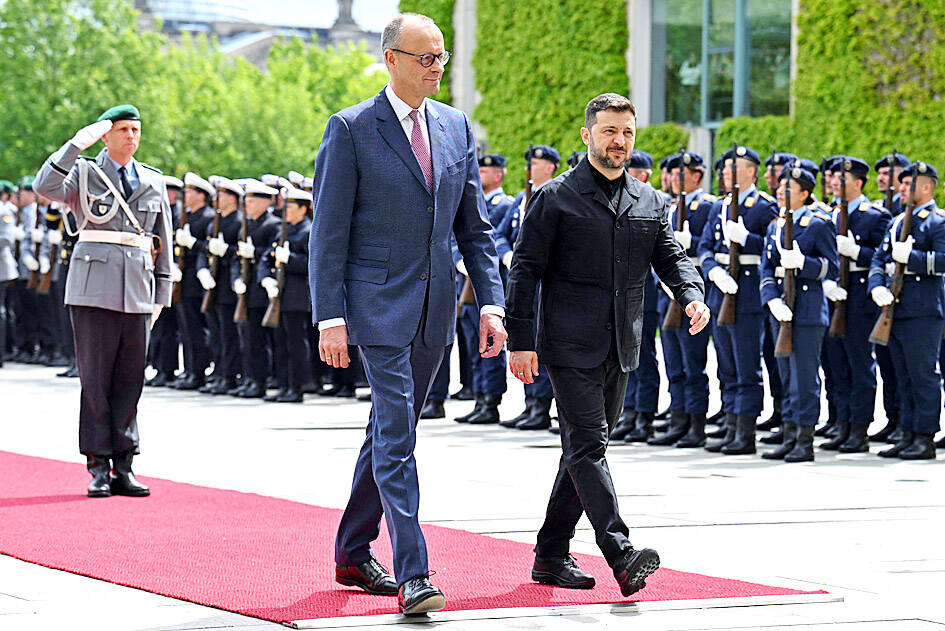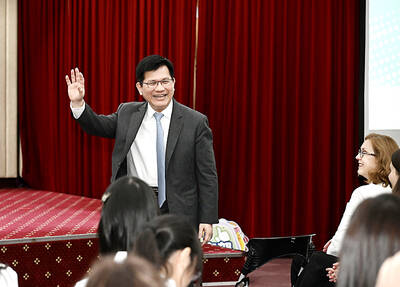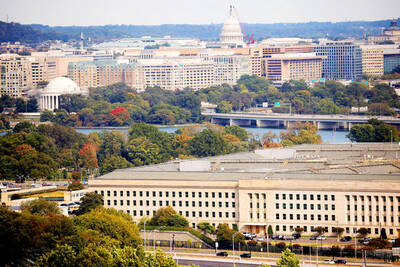US President Donald Trump on Tuesday said that Russian President Vladimir Putin was “playing with fire,” while Washington is weighing new sanctions against Moscow over the Ukraine war.
Trump’s comments came two days after he called the Kremlin leader “absolutely crazy” following a major drone attack on Ukraine.
Moscow, which invaded Ukraine in February 2022, said that it was responding to escalating Ukrainian strikes on its own civilians and accused Kyiv of trying to “disrupt” peace efforts.

Photo: Reuters
Diplomatic efforts to end the war have intensified in the past few weeks, with Ukrainian President Volodymyr Zelenskiy on Tuesday calling for a three-way summit with Trump and Putin.
Putin rejected calls to meet Zelenskiy in Turkey earlier this month and the Kremlin has said a meeting between the two leaders would only happen after some kind of “agreement” is reached.
“What Vladimir Putin doesn’t realize is that if it weren’t for me, lots of really bad things would have already happened to Russia, and I mean REALLY BAD. He’s playing with fire!” Trump wrote on the Truth Social platform.
The Wall Street Journal and CNN reported that Trump is considering fresh sanctions as early as this week.
Trump on Sunday told reporters that he was “absolutely” weighing such a move.
The White House said that Trump was keeping “all options” open.
“This war is [former US president] Joe Biden’s fault, and President Trump has been clear he wants to see a negotiated peace deal. President Trump has also smartly kept all options on the table,” White House press secretary Karoline Leavitt said in a statement.
Biden imposed sweeping sanctions after Russia’s invasion. Trump has so far avoided what he says could be “devastating” sanctions on Russian banks.
Asked about Trump’s comments, Kremlin spokesman Dmitry Peskov yesterday in a conference call with reporters said that the national interest was paramount for Putin.
A possible meeting of Putin with Trump and Zelenskiy should take place only following preparations and talks, Peskov added.
Russian authorities said that almost 150 Ukrainian drones had been intercepted overnight, including 33 heading toward Moscow.
Ukraine said it was Russia that had targeted civilians.
“We need to end this eternal waiting — Russia needs more sanctions,” Zelenskiy’s chief of staff Andriy Yermak said on Telegram on Tuesday.
Zelenskiy yesterday met with German Chancellor Friedrich Merz in Berlin as Ukraine seeks further military support amid the escalation in Russia’s bombing campaign.
US Special Envoy for Ukraine and Russia Keith Kellogg told Fox News that the next peace talks between Russia and Ukraine, if they happen, would likely take place in Geneva, Switzerland, after Moscow rejected the Vatican as a venue.
The aim would then be to get Trump, Putin and Zelenskiy together, “and hammer this thing out,” Kellogg said.
The Swiss government would not confirm that it would host the talks.
“Switzerland remains ready to offer its good offices,” the Swiss Ministry of Foreign Affairs said in a statement, adding that it was “in contact with all parties.”
Additional reporting by Reuters and AP

FIREPOWER: On top of the torpedoes, the military would procure Kestrel II anti-tank weapons systems to replace aging license-produced M72 LAW launchers Taiwan is to receive US-made Mark 48 torpedoes and training simulators over the next three years, following delays that hampered the navy’s operational readiness, the Ministry of National Defense’s latest budget proposal showed. The navy next year would acquire four training simulator systems for the torpedoes and take receipt of 14 torpedoes in 2027 and 10 torpedoes in 2028, the ministry said in its budget for the next fiscal year. The torpedoes would almost certainly be utilized in the navy’s two upgraded Chien Lung-class submarines and the indigenously developed Hai Kun, should the attack sub successfully reach operational status. US President Donald Trump

Taiwan Semiconductor Manufacturing Co (TSMC, 台積電) is expected to start construction of its 1.4-nanometer chip manufacturing facilities at the Central Taiwan Science Park (CTSP, 中部科學園區) as early as October, the Chinese-language Liberty Times (the Taipei Times’ sister newspaper) reported yesterday, citing the park administration. TSMC acquired land for the second phase of the park’s expansion in Taichung in June. Large cement, construction and facility engineering companies in central Taiwan have reportedly been receiving bids for TSMC-related projects, the report said. Supply-chain firms estimated that the business opportunities for engineering, equipment and materials supply, and back-end packaging and testing could reach as high as

ALL QUIET: The Philippine foreign secretary told senators she would not respond to questions about whether Lin Chia-lung was in the country The Ministry of Foreign Affairs on Wednesday confirmed that a business delegation is visiting the Philippines, but declined to say whether Minister of Foreign Affairs Lin Chia-lung (林佳龍) is part of the group, as Philippine lawmakers raised questions over Lin’s reported visit. The group is being led by Deputy Minister of Agriculture Huang Chao-chin (黃昭欽), Chinese International Economic Cooperation Association (CIECA) chairman Joseph Lyu (呂桔誠) and US-Taiwan Business Council (USTBC) vice president Lotta Danielsson, the ministry said in a statement. However, sources speaking on condition of anonymity said that Lin is leading the delegation of 70 people. Filinvest New Clark City Innovation Park

DEFENSIVE EDGE: The liaison officer would work with Taiwan on drones and military applications for other civilian-developed technologies, a source said A Pentagon unit tasked with facilitating the US military’s adoption of new technology is soon to deploy officials to dozens of friendly nations, including Taiwan, the Financial Times reported yesterday. The US Department of Defense’s Defense Innovation Unit (DIU) is to send a representative to collaborate with Taiwan on drones and military applications from the semiconductor industry by the end of the year, the British daily reported, citing three sources familiar with the matter. “Drones will certainly be a focus, but they will also be looking at connecting to the broader civilian and dual-use ecosystem, including the tech sector,” one source was